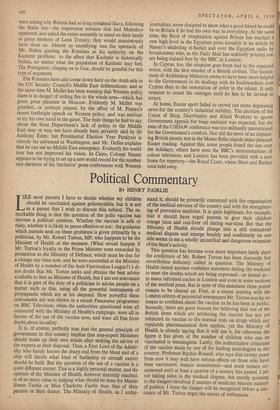Political Commentary
BY HENRY FAIRLIE IRE most parents I have to decide whether my children should be vaccinated against poliomyelitis, but it is not as a parent that I wish to discuss this subject. The re- markable thing is that the question of the polio vaccine has become a political question. Whether the vaccine is safe or risky, whether it is likely to prove effective or not : the guidance which parents seek on these problems is given primarily by a politician, by Mr. Robert Turton, MP, who happens to be the Minister of Health at the moment. (What would happen if Mr. Turton's loyalty to the Prime Minister were rewarded by promotion to the Ministry of Defence, which must be due for a change any time now, and he were succeeded at the Ministry of Health by a member of the Anti-Vaccination League?) I do not doubt that Mr. Turton seeks and obtains the best advice available to him as Minister of Health, but I am not convinced that it is part of the duty of a politician to advise people on a matter such as this, using all the powerful instruments of propaganda which are at his disposal. How powerful these instruments are was shown in a recent Panorama programme on BBC Television, when the authorities questioned were all connected with the Ministry of Health's campaign, were all in favour of the use of the vaccine now, and were all free from doubt about its safety.
It is, of course, perfectly true that the general principle of government in this country implies that non-expert Ministers should make up their own minds after seeking the advice of the experts at their disposal. Thus, a First Lord of the Admir- alty who barely knows the sharp end from the blunt end of a ship will decide what kind of battleship or aircraft carrier should be built. But the question of the use of a vaccine is a quite different matter. This is a highly personal matter, and the opinion of the Minister of Health, however sincerely reached. is of no more value in judging what should be done for Master Simon Fairlie or Miss Charlotte Fairlie than that of their parents or their doctor. The Ministry of Health, as I under- stand it, should be primarily concerned with the organisation of the medical services of the country and with the strengthen- ing of preventive medicine. It is quite legitimate, for example. that it should have urged parents to give their children orange juice and cod-liver oil during war-time. But that the 'Ministry of Health should plunge into a still unresolved medical dispute and emerge brashly and confidently on one side seems to me a wholly unjustified and dangerous extension of the State's activity.
This question has become even more important lately since the confidence of Mr. Robert Turton has been discreetly but nevertheless definitely called in question. The Ministry of Health issued another confident statement during the weekend to meet the doubts which are being expressed—or hinted at— in many informed circles in London and even in some sections of the medical press. But in spite of this statement three points remain to be cleared up. First, at a recent meeting with the London editors of provincial newspapers Mr. Turton was by no means so confident about the vaccine as he has been in public. Secondly, there are good reasons for believing that one of the British firms which are producing the vaccine has not yet subjected its vaccine to the normal tests on drugs which any reputable pharmaceutical firm applies; yet the Ministry of Health is already saying that it will use it, for otherwise the figure it has given of the number of children who can be vaccinated is meaningless. Lastly, the authoritative criticisms of the vaccine made by one of the leading neurologists in the country, Professor Ritchie Russell, who says that twenty years from now it may well have serious effects on those who have been vaccinated, remain unanswered—and must remain un- answered until at least a quarter of a century has passed. I am not taking sides in the medical dispute, but merely pointing to the dangers involved if matters of medicine become matters of politics. I hope the danger will be recognised before a suc- cessor of Mr. Turton urges the merits of euthanasia. Getting on for two years ago, in the first political article I ever wrote for the Spectator, I said that the lesson of Crichel Down—that there was no limit to the power of elected author- ity, that majorities have become our new tyrants—could be read in the activities of elected bodies throughout the country. When challenged by Mr. Richard Crossman in the New States- man, I instanced, among other examples, the decision of the Fulham Borough Council to destroy The Grange. During the intervening months the Council has ridden roughshod not only over all opposition to its scheme but also over the very gener- ous offer which has been made by a private individual to save The Grange and restore it. A fortnight ago the final protest— I am afraid it may be the final protest—was stifled by the Labour majority in the Fulham Council. I am glad to see that Tribune has given the Fulham Council a smack acroa the face.
One sentence of what I said about Mr. Heathcoat-Amory recently has apparently been misunderstood in certain quar- ters. I did not wish to imply in any way that he is one of the rebels against Sir Anthony Eden's leadership—nothing could be farther from the truth. My paragraph was merely meant to refer to the part he plays in the Government both inside and outside the Cabinet.

















































 Previous page
Previous page